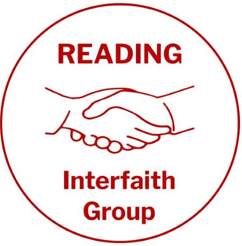What is a good person?
An interfaith event Sunday 11th May 2025
On Sunday 11th May two dozen people arrived at St Mary’s Reading Minster Church to be led by Alan Race to listen to speakers and discuss this question together and enjoy refreshments afterwards.
Alan welcomed everyone and apologised that one of the speakers, a Sikh from Hounslow had not been able to come due to an unforeseen double-booking. The Zoroastrian speaker who was scheduled to Zoom from Cambridge failed to connect, so there was only Rabbi Rene Pfertze from Maidenhead who was warmly welcomed. Alan suggested he was the other speaker, now from the Christian perspective.
Alan began by suggesting the question seems on the surface to be an easy question and one that all might agree on. It means being generous, kind, loving etc., but if you delve deeper and look at the question in relation to the big issues in the world it becomes more contentious.
At that point he handed over to the rabbi who turned the question on its head and asked what maybe is an even easier question: What is a bad person?
He then proceeded to tell a number of his favourite stories which opened up the questions to deeper thought.
Rabbi Rene explained the foundation of his thinking as a liberal Jew by telling us stories from Jewish tradition. He began with the saying, “That which is hateful to you, do not do to another”, which is attributed to Hillel the elder and Rabbi Shammai, both Jewish religious leaders from the 1st century BCE. This quote, also known as the Golden Rule, is a fundamental principle in Judaism and is often seen as a foundational ethical guideline in many spiritual traditions.
Rabbi Rene explained that in Judaism there is only a good person, a “mensch”, who stands between two opposing inclinations – perfection and evil intentions. Thus, the hero struggles to be a good human being. He pointed out that if there was no evil in the world that struggle would not exist and existence would be bland.
He told us that scholars had long debated “Was it good for human beings to be created?” In fact, two millennia of debate had not solved the question and yet we are still here and dealing with the results of that question, for some questions have no answer.
He told us about Rabbi Zusya known for the famous quote on his death bed, “In the coming world, they will not ask me: ‘Why were you not Moses?’ They will ask me: ‘Why were you not Zusya?’.” This quote highlights the importance of embracing one’s unique individuality and becoming the best version of oneself, rather than striving to be someone else or indeed spending long hours on debate.
In another story he told us of the old man planting a tree, who was asked what the point was as he would soon die. And he replied that he was planting it for his children and grandchildren. This highlights the importance of the legacy of goodness which affects future generations. The Torah he said shows us righteousness, justice and loving kindness, but above all loving kindness and to respect everyone who is the image of God.
After this moving start he handed over to Alan who introduced a poem by Louie Horne: “Open your heart to the wonder of living” and talked about the indicators of a good person which result from opening up to the challenges of life and also of expressing laughter and love.
Alan read a recent Declaration from a local Benedictine Christian Community from Madison, Wisconsin, in America which concluded:
“Recognizing that compassion and care for the vulnerable are central to the beliefs and values of all spiritual traditions, we invite all communities of faith in the United States to join us in speaking up and resisting policies of our government that violate inherent human dignity and inflict suffering on the most vulnerable among us, including our shared earth’s plants, animals, water, and air.”
While we were digesting this, Rabbi Rene reminded us of the story he had recounted earlier. This was the story of the ancient practice at the Temple Mount in Jerusalem where worshippers circulate clockwise out of respect, unless they experience bereavement or difficulty when they walk anticlockwise. This prompts the question, “What is the matter?”. Not with the idea of solving the problem but of demonstrating, “I see you and I am here to help you.”
These contributions led to a most lively discussion, including issues around hell and the afterlife, justice, and the failure to recognize evil by remaining silent and not acting on our beliefs. The difficult issues of loving our enemies and forgiveness were also raised. There was some opposition to the general nature of the Benedictine contribution from America and disagreement especially with the oppositional way it seemed to have been expressed. Alan responded by pointing out that the belief that “Recognizing that compassion and care for the vulnerable are central to the beliefs and values of all spiritual traditions” was the driving principle behind the Declaration and that the Declaration was a strong challenge to our actions in the face of all that went against compassion and care.
The meeting concluded at 20.15 with the wonderful thought that only God is good and we are all only human – and that in turn led into some welcome refreshments!
Carol Boulter

